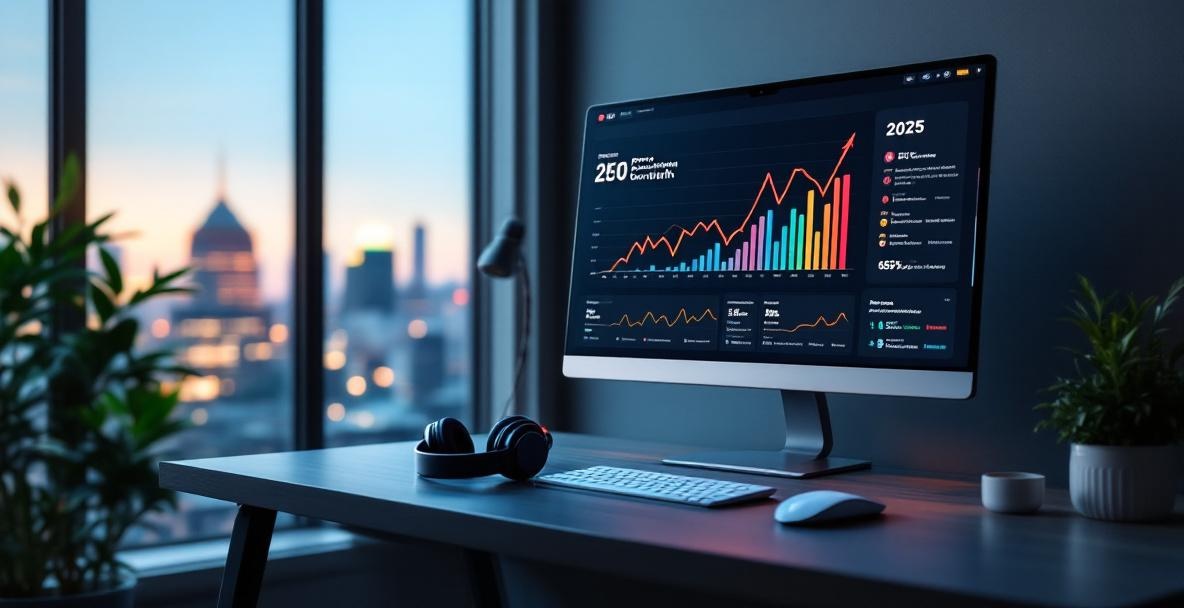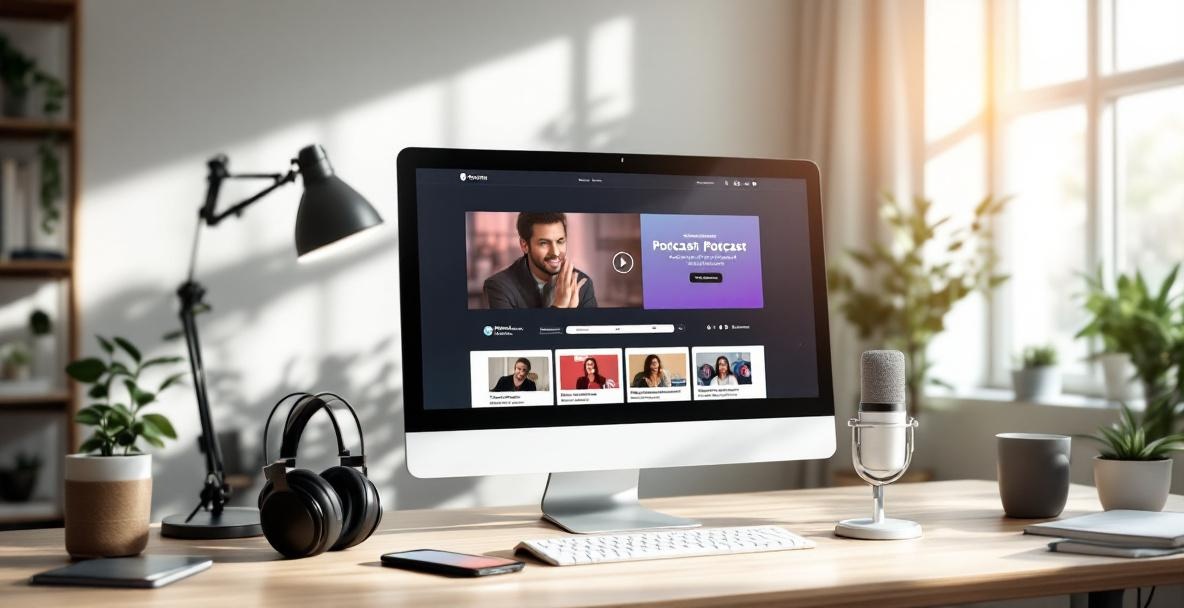Having your podcast heard is a whole different game than just recording it. In 2025, when thousands of shows are fighting for attention, getting noticed with the right SEO tactics can be your secret weapon. At Castee, we see that podcasters who take time to fine-tune their website for search enjoy more organic growth and build a loyal listener base faster than those who rely on content alone. Great audio is only one side of the coin; if your show is hidden in the noise, even the best content may go unheard. It pays to master these SEO techniques and put your podcast on the map.
Why Your Podcast Needs SEO in 2025

Podcasts Are Booming
Podcasting is reaching new heights this year, with more than a million shows competing for a spot in listeners' earbuds. It is harder than ever to get noticed with so many great podcasts out there, and standing out means planning your strategy carefully. What used to be an open field is now a crowded space where every detail counts. Every podcaster, whether new or seasoned, must work hard just to be found.
This surge changes things for both indie creators and big networks. Listeners are more selective now and choose a few favorite shows they really enjoy. That means your podcast must be easy to find if you want to build a dedicated listener base. For anyone aiming for real growth, a targeted SEO plan isn’t optional-it is essential.
A Quick SEO Refresher
Let’s go back to basics for a moment. SEO is all about making your podcast easy to find when people search online. Search engines like Google scan websites using many factors such as content relevance, clear site structure, user experience details, and signs of trust. Understanding these basics can help you boost your podcast’s visibility, and even a few simple tweaks can go a long way.
For a podcast website, this means fine-tuning your episode pages, show notes, transcripts, and extra content so it matches what your potential listeners are looking for. The goal is not just to appear in search results, but to show up for searches that truly matter. A smart mix of technical tweaks and creative content ensures your podcast comes off as both discoverable and engaging. This careful balance turns casual browsers into loyal fans.
The core rules never change: create valuable content that meets your audience’s needs, design your website so it is easy for visitors to use, and build trust with quality inbound links and active engagement. In 2025, search engines have become even better at picking up on audio details and structured data. Sticking to strong SEO fundamentals is the best way to keep your podcast visible as search trends shift.
Creating Content That Connects and Converts

Picking the Right Keywords
Finding the right keywords is the foundation of good SEO, and the approach has really changed recently. Today, top podcasters use phrases that sound natural, much like everyday conversation. With many listeners using voice search on smart speakers and assistants, matching real language gives you a real edge. Using the right keywords means reaching the people who are most likely to enjoy your show. Think beyond just your episode titles and imagine the questions your audience might ask.
When picking keywords for your site, don’t focus only on what you call your episodes. Consider the challenges your listeners face and the solutions they’re after. Tools like Google’s Keyword Planner and specialized podcast platforms pinpoint phrases that aren’t too competitive yet bring results. Aim for terms that help with discovering new podcasts, match your topic, and even capture what fans of similar shows might search for. Choosing keywords wisely is a crucial step toward growing your audience.
Work these keywords into your website in a natural way, especially in episode titles, descriptions, headings, and the opening lines of your show notes. The idea is to slip them in smoothly so they add value for readers instead of getting in the way. Since search engines now focus on overall topics rather than exact words, focusing on the right phrases will help your show be found by the right people. This approach makes your site friendlier for both readers and search engines.
Mastering Episode Metadata
Optimizing your metadata can make a huge difference. Every episode gives you a fresh chance to attract new listeners if you use thoughtful metadata. Start with clear, keyword-rich titles that tell your audience exactly what to expect. Avoid titles that are too clever or vague, as they can leave both listeners and search engines guessing. Well-optimized metadata can set your episodes apart from the rest.
Episode descriptions deserve plenty of attention because they impact both your search results and your listener decisions. Write descriptions that get right to the point, weaving in your main keywords naturally. Adding timestamps for key parts of your episode not only improves the user experience but also provides more text for search engines to scan. Consistency across your tags and categories reinforces your content’s focus, which is a big plus for SEO.
Getting the Most Out of Transcripts
Transcripts are no longer a nice-to-have, but a must-have for boosting your SEO. Today, search engines carefully analyze transcripts to measure how relevant and deep your content is. By providing full transcripts, you give search engines lots of indexable text, which can help your rankings climb. Well-crafted transcripts make your episodes more accessible and appealing to potential listeners. Make sure you break up long sections of text with clear headings, highlight important points and quotes, and mark speakers along with timestamps. Doing so, along with offering detailed show notes, builds a resource-rich foundation that helps new listeners discover and enjoy your podcast.
Improving Your Website Layout for a Smoother Experience
Navigation That Guides Your Visitors
Your website design is key to keeping visitors around and helping search engines figure out your content. The best podcast websites offer simple, clear navigation that puts all the important pages just a few clicks away. Organizing episodes into distinct categories by topic, season, or content type makes it easier for anyone to find what they need. A smart internal linking strategy connects related episodes, guides visitors to resource pages, and leads them toward subscription options. A well-structured site improves the user experience and boosts your search rankings at the same time. Linking your best content in a thoughtful way can make a big difference in how visitors explore your site.
Making Your Site Mobile-Friendly
Since over 70% of listeners use their phones, making your site mobile-friendly is a must. It isn’t enough to simply shrink your desktop design; your mobile version needs to guide users from discovering your show to subscribing with ease. Keep buttons big enough to tap, simplify navigation, and check that your audio player works smoothly on any device. Recent studies confirm that a mobile-optimized site gives you a boost in search rankings and keeps listeners engaged. Always test your mobile experience on different devices and connection speeds to ensure nothing stands in the way of a smooth visit.
Speeding Up Your Site
Loading speed matters a lot for keeping visitors on your website and for doing well in search rankings. Podcast sites often feature large audio files and many images, which can slow things down if not properly managed. Optimizing images, using browser caching, and loading media elements only when needed can significantly cut down on wait times. Small improvements in speed can lead to big gains in visitor satisfaction and SEO performance. Speed optimizations can lower bounce rates and drive more conversions. Also, consider progressive loading for your audio player and offer multiple quality options so your listeners have a smooth, uninterrupted experience.
Expanding Your Reach with Videos and Social Sharing

Adding Video Content
Video can add a fresh dimension to your podcast’s appeal. Short clips or full recordings of your sessions can boost your visibility on platforms like YouTube, which is a powerful search tool by itself. Choose clips that spotlight key moments, create engaging thumbnails, and write video titles and descriptions that use your smart keywords. By sharing your videos on both your website and YouTube, you create multiple avenues for new listeners to discover your show. Incorporating video effectively helps you grow your reach and drives extra engagement with your content. Even small, well-edited video bits can capture attention and open up your podcast to a whole new audience.
Social Media Moves That Pay Off
Social media is a great way to spread the word about your show. While shares might not directly boost your search rankings, the buzz they create can lead to more backlinks and additional traffic-both of which are important. Create engaging posts for each episode, and consider making short audiogram videos for platforms like Instagram, Twitter, and TikTok. Smart social media strategies build a community around your podcast and help drive more consistent traffic to your site. Stick with a regular posting schedule so your fans always know when to expect new episodes, and watch as your online presence grows.
Keeping an Eye on SEO Changes

Using Analytics Tools
Using the right analytics tools can guide your SEO improvements in a big way. In 2025, the most successful podcasters rely on solid data to see what works and what needs a tweak. Tools like Google Analytics, paired with podcast platforms that track downloads and engagement, offer deep insights into your audience’s behavior. By analyzing these numbers, you can follow the complete journey from the first click to regular listenership. Data-driven insights let you refine your strategy and focus on what truly matters for your audience.
Staying Updated on Search Changes
Search engine updates keep coming, so it is important to stay in the loop. Rather than scrambling with every tiny change, focus on the big picture: give your listeners a great experience, offer solid content, and maintain a clear website structure. Stay connected with industry news and monitor your own metrics to know when changes are really needed. Staying updated with search changes helps you build a strategy that can ride out the ups and downs of algorithm updates. Keep learning about trends, follow industry announcements, and let your content naturally shine through.
Next Steps to SEO Success
Improving your podcast’s SEO is a journey that rewards effort and patience. Begin by optimizing your content with targeted keywords, ensuring your site is easy to navigate, and perfecting your metadata. Add value with clear transcripts and engaging show notes, then build on that with multimedia elements and a strong social media presence. Throughout this process, keep a close eye on your analytics and be ready to adjust your strategy to give your listeners the best experience possible. Taking these steps will give your podcast a competitive edge in a crowded market.
Ready to transform your podcast's online visibility? Try Castee today and leverage our comprehensive podcast marketing platform to implement these SEO strategies efficiently. Our specialized tools for podcasters take the guesswork out of optimization, helping you focus on creating great content while we handle the technical aspects of making it discoverable. Join thousands of successful podcasters who've partnered with us to grow their audiences through strategic, sustainable SEO practices.
Leave a Reply